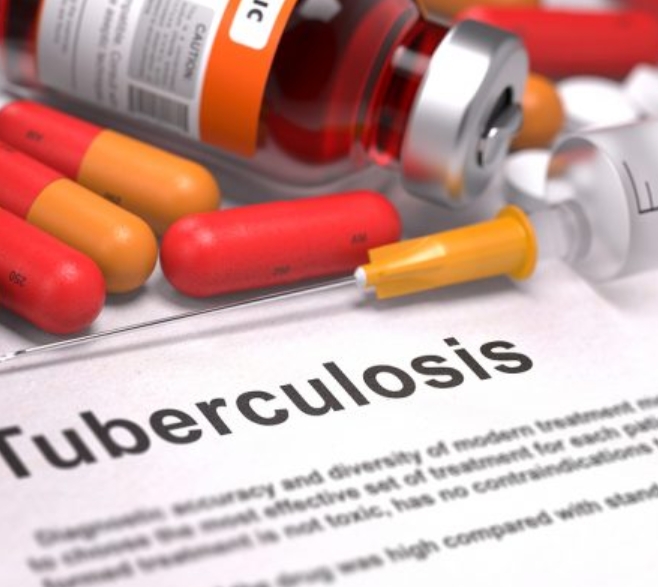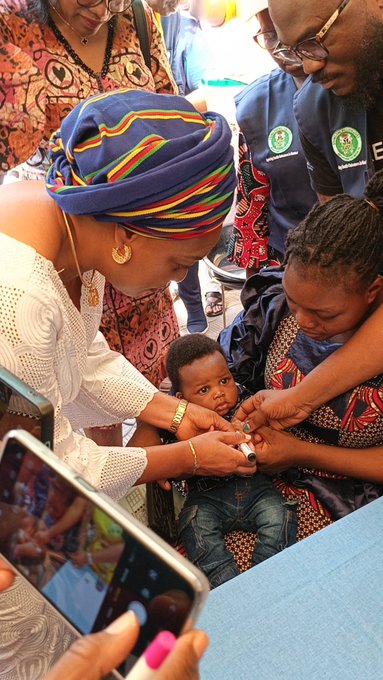Health
Nigeria’s TB Case Finding Rises By 50%, Says WHO

The World Health Organisation said Nigeria had significantly increased its national Tuberculosis case finding by 50 per cent in 2021 using innovative approaches.
The WHO Regional Director for Africa, Dr Matshidiso Moeti, made this known in her message in commemoration of World TB Day.
World TB Day is marked yearly on March 24 to raise public awareness about the devastating health, social and economic consequences of this preventable disease and call for accelerated action to end it.
READ ALSO: 135 Million Africans Have Hearing Problems, Says WHO
This year’s theme, ‘Yes, we can end TB’, highlights the need to ensure equitable access to prevention and care, in line with the drive towards Universal Health Coverage and the Sustainable Development Goals.
Dr Moeti said it was important to find and diagnose cases of TB so that the patients can be treated, and their contacts offered preventive medication.
“Nigeria is an example of a country that managed to significantly increase national TB case finding by 50 per cent in 2021 using innovative approaches such as the expansion of the daily observed treatment protocols, use of digital technologies, Community Active Case Finding, and enlisting Public Private Mix initiatives.
“TB requires concerted action by all sectors: from communities and businesses to governments, civil society and others,” she said in a press statement.
READ ALSO: Cancer May Kill One Nillion Africans Yearly By 2030 – WHO
She said the African Region was on the threshold of reaching a 35 per cent TB death reduction as there had been a 26 per cent reduction in TB deaths between 2015 and 2021.
“Seven countries — Eswatini, Kenya, Mozambique, South Soudan, Togo, Uganda, and Zambia—have reached a 35 per cent reduction in deaths since 2015,” she noted.
She, however, decried the challenges in TB prevention and control.
“First, the delayed diagnosis and testing. There is still a notable gap between the estimated number of new infections and case notifications of TB: 40 per cent of people living with TB did not know of their diagnosis or it was not reported in 2021. One million people are living with TB in the region and have not been detected.
“Second, the link between TB and HIV. Approximately 20 per cent of people newly diagnosed with TB are also living with HIV infection.
READ ALSO: Africa Records 26,000 Cholera Cases, 660 Deaths In January – WHO
“Third, the multi-drug resistant TB. In the African region, only 26 per cent of all people living with multi-drug resistance are receiving the appropriate treatment.”
Meanwhile, she hailed the member states for the increasing uptake of new tools and guidance recommended by WHO, resulting in early access to TB prevention and care, and better outcomes.
“In the African Region, the use of rapid diagnostic testing has increased from 34 per cent in 2020 to 43 per cent in 2021, which will improve countries’ ability to detect and diagnose new cases of the disease.
“We must work together to develop innovative approaches to reach vulnerable populations and ensure that they have access to quality TB care and management.
“The second UN High-level Meeting on TB in September 2023 will provide a rare opportunity to give global visibility to the disease and mobilize high-level political commitment to end TB.
“Ending TB is feasible with the decline in TB deaths and cases, and the elimination of economic and social burdens associated with it.
“Specially today, I urge leaders, governments, partners, communities, and all stakeholders to urgently foster the resilient health systems required to accelerate the TB response so that we can reach the Sustainable Development Goals targets by 2030. Yes, we can end TB in our lifetime,” she added.
Health
LASG FLags Off Polio Outbreak Response Campaign

The Lagos State Government, through the Lagos State Primary Health Care Board, has launched the 2025 Polio Outbreak Response Campaign, reaffirming its commitment to eradicating polio and safeguarding the health of its children.
The ceremony, held at the Simpson Primary Healthcare Centre, was led by the First Lady of Lagos State, Dr. (Mrs.) Claudiana Ibijoke Sanwo-Olu, represented by Mrs. Widad Jumoke Mustafa, a member of the Committee of Wives of Lagos State Officials (COWLSO).
In her address, the First Lady emphasised the state government’s proactive measures to keep Lagos polio-free, highlighting the critical importance of the campaign in preventing the debilitating effects of poliomyelitis, which can result in paralysis or death.
READ ALSO: IMPEACHMENT: Lagos Ex-Speaker, Obasa’s ‘Sins’ Revealed
The First Lady also called on parents, community leaders, and stakeholders to support the campaign by ensuring eligible children are vaccinated.
Targeting children aged 0-59 months, vaccination teams will administer the Oral Polio Vaccine (OPV) to prevent virus transmission.
Dr. Kemi Ogunyemi, the Special Adviser on Health, expressed gratitude to Lagosians for their continued cooperation in the fight against polio. While appreciating all healthcare workers and partners for their services, Mrs. Ogunyemi encouraged parents to present their children and wards for the exercise.
Also speaking, the Chairman of Lagos Mainland Local Government, Mrs. Omolola Rashidat Essien opined that Immunization is key in ensuring that children are kept safe from polio and other vaccine preventable diseases.
Dr. Abimbola Bowale, the Supervising Permanent Secretary, Lagos State Primary Health Care Board, who also spoke at the event, underscored the life-saving importance of immunization.
“All children aged 0-59 months need multiple doses of the polio vaccine to ensure full protection. Any child missed represents a potential risk for the poliovirus to spread. The vaccine is safe, effective, and crucial in keeping our communities polio-free,” he stated.
Dr. Bowale also outlined several strategies to ensure the success of the campaign, including fixed post teams stationed at primary healthcare centres and public health facilities, house-to-house visits, and a transit strategy to reach special locations such as places of worship, schools, motor parks, and other public venues.
The event concluded with Dr. (Mrs.) Claudiana Ibijoke Sanwo-Olu officially launched the campaign, marking a renewed effort to maintain Lagos State’s polio-free status.
Headline
Lagos Cholera Cases Rise To 421

The Lagos state suspected cholera cases have risen to 421.
The Commissioner for Health, Akin Abayomi disclosed this on his Instagram handle @profakinabayomi on Saturday.
“As of June 20, 2024, an additional four suspected cholera cases have been reported, as illustrated in the accompanying graph,” he wrote.
He noted that the Emergency Operations Centre in collaboration with all relevant partners is actively engaged in contact tracing, community-based surveillance, awareness campaigns, sample testing, and ensuring that confirmed cholera cases receive appropriate medical treatment.
READ ALSO: Two Suspects Arrested For Stealing Car From Mosque During Juma’at Prayer
On Friday, the commissioner confirmed 35 cases out of the 417 suspected cases and 24 deaths across 20 Local Government Areas in the state.
The cases were reported from Agege, Badagry, Ikeja, Mushin, Ajeromi-Ifelofun, Epe, Ikorodu, Ojo, Alimosho, and Eti-Osa.
Others were Kosofe, Oshodi-Isolo, Amuwo-Odofin, Ibeju-Lekki, Lagos Island, Shomolu, Apapa, Ifako-Ijaiye, Lagos mainland, and Surulere.
Cholera is a food and water-borne disease caused by ingesting the bacteria— Vibrio cholerae — in contaminated water and food. Cholera can cause severe acute watery diarrhoea, and the severe forms of the disease can kill within hours if left untreated.
In Nigeria, cholera is an endemic and seasonal disease, occurring annually mostly during the rainy season and more frequently in areas with poor sanitation.
READ ALSO: Police Arrest 28yr Old Suspected Cultists, Recover Gun In Delta Community
The World Health Organisation on Thursday announced a spike in cholera in several regions of the world, with almost 195,000 cases and over 1,900 deaths reported in 24 countries since the start of 2024.
WHO said the Eastern Mediterranean Region reported the highest number of cases, followed by the African Region, the Region of the Americas, the Southeast Asia Region, and the European Region.
The global health body, however, noted that there are no reported cases in the Western Region, according to its bulletin released on Wednesday.
It said it exhausted its global stockpile of Oral Cholera Vaccines by March but was able to exceed “the emergency target of five million doses in early June for the first time in 2024.”
Health
AUTISM: What You Need To Know

By Silver Yeibake
Autism, commonly known as Autism Spectrum Disorder (ASD), is a neurodevelopmental disorder that affects communication, social interaction, and behavior. Autism is referred to as a spectrum condition since it can manifest in a variety of symptoms and abilities. While the actual cause of autism is unknown, evidence suggests that genetic and environmental factors interact to influence its development.
The risk factors include a sibling with autism, advanced age of parents, exposure to certain air pollutants and pesticides before birth, extreme prematurity, mothers with diabetes, immune system disorders or obesity, any difficulty with delivery leading to deprivation of oxygen to the baby’s brain, fever during pregnancy, lack of certain vitamins minerals during pregnancy, and certain genetic conditions, such as Down, fragile X, and Rett syndromes.
“Risk factors can not on their own cause a disease. However, they can increase the likelihood of that disease in a person.”
It is important to know that contrary to trending claims online, there is no scientific or medical evidence that vaccines or consumption of sugar are risk factors for autism.
READ ALSO: Kidney Stones: What You Need To Know
Autism is defined by difficulties in social interaction and communication. Individuals with autism may struggle to grasp social cues, maintain eye contact, and engage in typical back-and-forth conversations. Some people may also engage in meaningless, repetitive actions, such as hand-flapping or rocking, and have strong interests in specific areas.
It is essential to remember that autism is a lifelong diagnosis, but with early intervention and adequate care, people with autism can live fulfilling lives.
Autism treatment frequently includes behavioral therapy, speech therapy, occupational therapy, and social skills training. Each individual with autism is unique, thus interventions should be tailored to meet their personal needs and strengths.
In spite of the difficulties that autism can cause, many people with autism possess unique talents and abilities. Some people may succeed in fields such as music, art, mathematics, or programming, thus it is important for society to acknowledge and honor the qualities and achievements of people with autism.
In summary, autism is a complicated and diverse disorder that affects individuals in various ways. By raising autism knowledge, understanding, and acceptance, we can build a more inclusive society in which people with autism can thrive and attain their full potential.
Dr. Yeibake, Weriwoyingipre Silver.
Senior Registrar,
Faculty Of Pediatrics,
WACP

 News5 days ago
News5 days agoHow To Calculate Your Taxable Income

 Metro4 days ago
Metro4 days agoEdo widow-lawyer Diabolically Blinded Over Contract Seeks Okpebholo’s Intervention

 News4 days ago
News4 days agoExpert Identify Foods That Increase Hypertension Medication’s Effectiveness

 Headline5 days ago
Headline5 days agoRussia Deploys Navy To Guard Venezuelan Oil Tanker Chased By US In Atlantic

 Politics3 days ago
Politics3 days agoAPC Leaders, Tinubu/Shettima Group Call For Wike’s Removal As FCT Minister

 Metro5 days ago
Metro5 days agoJUST IN: Court Grants Malami, Wife, Son N500m Bail Each

 Entertainment5 days ago
Entertainment5 days agoVIDEO: ‘Baba Oko Bournvita,’ Portable Drags His Father, Alleges Bad Parenting, Extortion

 Politics5 days ago
Politics5 days ago2027: Details Of PDP Leaders, Jonathan’s Meeting Emerge

 Politics3 days ago
Politics3 days agoWike A ‘Pestilence’ On Rivers, I Resigned Because Of It – Ex-Commissioner

 Headline2 days ago
Headline2 days agoScience Discovers Why Hungry, Broke Men Prefer Bigger Breasts






























